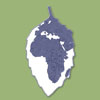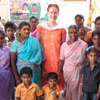Graduate Student

Emily Beggs
Emily is interested in the political ecology of working landscapes, science studies, and agriculture-as- conservation in the Americas. Currently, she works with agricultural communities in the Galapagos Islands to study dynamic relations between conservation strategies and agrofood systems. Emily uses an agroecological lens to examine the convergence of island livelihood practices, biodiversity management, and food politics on Isla Santa Cruz. Emily completed a B.A. in Politics and Latin American and Latino Studies at UC Santa Cruz. She has worked and conducted research at urban and rural farms and gardens in California, Ecuador, Chile, and Nova Scotia. Other interests include natural history, ethnoecology, nature and society, and foodways.

Madeline Brown
My research focuses on resource management and use in forest systems, particularly looking at trust and cooperation among Yi mushroom harvesters in Yunnan Province, China. I am broadly interested in common-pool resource management, social networks, processes of NTFP commodification, social aspects of economic practice, and the creation and transmission of ethnoecological knowledge.

Alejandro Feged
Alejandro Feged works in the behavioral ecology of malaria in the Colombian Amazon Basin, trying to understand why some ethnicities have a higher incidence than others in spite of sharing the same environmental risks. In his long and convoluted quest, he has also explored clustering analysis, agent based simulations, disease dispersal network from time series analysis, and socioeconomic risk factors. He praises good football even if it comes from Barcelona or Real Madrid.

David Gilbert
My research takes an environmental anthropology approach to examine in detail how Indonesian forest farmers’ agroforestry practices mediate the political, economic and ecological changes associated with accelerating rural industrialization. Since 2005 I have lived in Indonesia and the Amazon for a total of three years, working on ecological surveys, environmental advocacy and reportage projects. My work has been supported by student grants from Wenner Gren, American Institute for Indonesian Studies and Stanford’s Abbasi Program in Islamic Studies, and through fellowships as a National Geographic Young Explorer, Henry Luce Scholar and Fulbright Scholar. I graduated Cum Laude from Claremont McKenna College in 2005 with a BA in Biology.

Maron Greenleaf
I am interested in human responses to climate change and efforts create more sustainable forms of economic growth. Currently, I study the social significance of carbon markets and efforts to reduce deforestation and forest degradation (REDD) to mitigate climate change in Brazil and elsewhere. I graduated from Yale University with a B.A. in political science and earned a J.D. from N.Y.U.

Elana Jordan
E’lana graduated from the University of Chicago with a B.A. in Anthropology in 2007. She is currently interested in researching the direct and indirect ways in which health is impacted by migration within Mexican farmworkers in California. Specifically, she would like to focus on nutritional health, demographic shifts, food availability, social networks and organizations, and food sharing practices. Major questions around her research involve how specific groups adapt to changes in food availability, the strategies used to buffer against food insecurity, and what are the specific health outcomes.

Tony Marks-Block
I was raised in southeast San Francisco where I was active in environmental justice movements and ecological restoration projects. After graduating with a degree in Natural Resources from Cornell University I spent six years developing participatory action research projects with youth of color in Oakland, California, on local air and water quality issues.
My research interests are in California Indian ecological knowledge and how indigenous eco-cultural practices impact food sovereignty, cultural preservation, human/ecological health and biodiversity. I am interested in how state agencies and the settler/colonial population impact contemporary indigenous ecological practices as well as how native communities transfer knowledge to the next generations.

Samuel Maull

Elly Power
Elly Power is interested in exploring the dynamics of human social groups, especially issues of cooperation, competition, and prestige. Her particular focus lies in using the theory and methods of human behavioral ecology, especially signaling theory, to investigate religious practice. For her dissertation research, she is exploring the social consequences of public ritual practice in a village in Tamil Nadu, India.

Michael Price
Michael Price studies human behavioral ecology, focusing particularly on the mathematical and computer modeling of human behavior. Some of the models he uses are: optimal foraging theory, costly signaling, evolutionary game theory, and agent based modeling. He was born and raised in the Indonesian province of Papua (formerly Irian Jaya) on the island of New Guinea. He received my Bachelor’s degree in Physics from Harvey Mudd College. After graduating from Harvey Mudd and prior to matriculating at Stanford he worked as an aerospace engineer. He draws on the technical skills he learned as a physicist and engineer in his anthropological studies.

Shanon Randolph
Shannon Randolph comes to us from Sub-Saharan Africa, where she conducted medical and environmental anthropology research in Kenya, Zambia and Madagascar and agroforestry and HIV/AIDS education extension work with the Peace Corps in Cameroon. Her dissertation topic concerns the social life of wild animal meat (i.e., bushmeat) in Yaounde, Cameroon (West-Central Africa). Through a unique combination of discourse analysis and ego-network analysis, her research will explore the symbolic meaning and the costs and benefits associated with the consumption and trading of different Central African forest animal species in an urban Central African context.

Elspeth Ready
Elspeth Ready's archaeological and ethnographic research interests include human subsistence ecology and the behavioural basis of the material record. She is interested in the diversity of modern Homo sapiens' ecological adaptations, as well as the role of environmental variability in hominid evolution. Elspeth's intended dissertation research will examine traditional subsistence activities among Inuit in northern Quebec, in particular, the economic and social importance of country foods, and the effect of changed weather patterns on different subsistence activities. She is also active in zooarchaeological research investigating the foraging adaptations of Neandertals and early modern humans in Western Europe.

Caleb Tomlinson
I am interested in the interactions between resource-using societies and resource-producing ecosystems. My focus is the shaping of fire-adapted ecosystems through anthropogenic fire use and through altering naturally occurring fire regimes. As societies either introduce or exclude fire from ecosystems, how does this affect resilience to future disturbances? Where exclusion of traditional fire use has decreased ecosystem resilience, can fire use be reintroduced to the benefit of ecosystems and societies? I have worked in wildifire suppression and management for the past twelve summers, and I have a BA&Sc from Quest University in Squamish, British Columbia.

Ciara Wirth
Is it possible for indigenous societies who have recently become integrated into market society to avoid the overexploitation of their resources? In societies that evolved in conditions of resource abundance, what type of intervention could catalyze the development of effective resource management practices for sustainable use at the community level? I am interested in these questions and in the prospects for adaptive co-management with indigenous societies in the Neotropics, especially those that are characterized by egalitarian social structures and a common property regime where ownership is entrusted to the group.

Yeon-Jung Yu
Yeon Jung Yu is working on her dissertation “Social Networks and Social Capital of Female Sex Workers (FSWs) in China: New Techniques for Studying Marginalized Populations at Risk.” In order to map the social networks and measure the social capital of Female Sex Workers (FSWs), largely migrants from rural areas, Yu has conducted two years of ethnographic fieldwork in southern China. Since the commercial sex work population is a major reservoir for sexually transmitted diseases (STDs), her research will provide a new lens through which epidemiological studies of STDs can be viewed. As the first ethnographic project mapping the social networks of FSWs in China, her project will further contribute to the discourse on contemporary women, family, morality and ethics, migration, post-socialism, and neo-liberalism in China.
